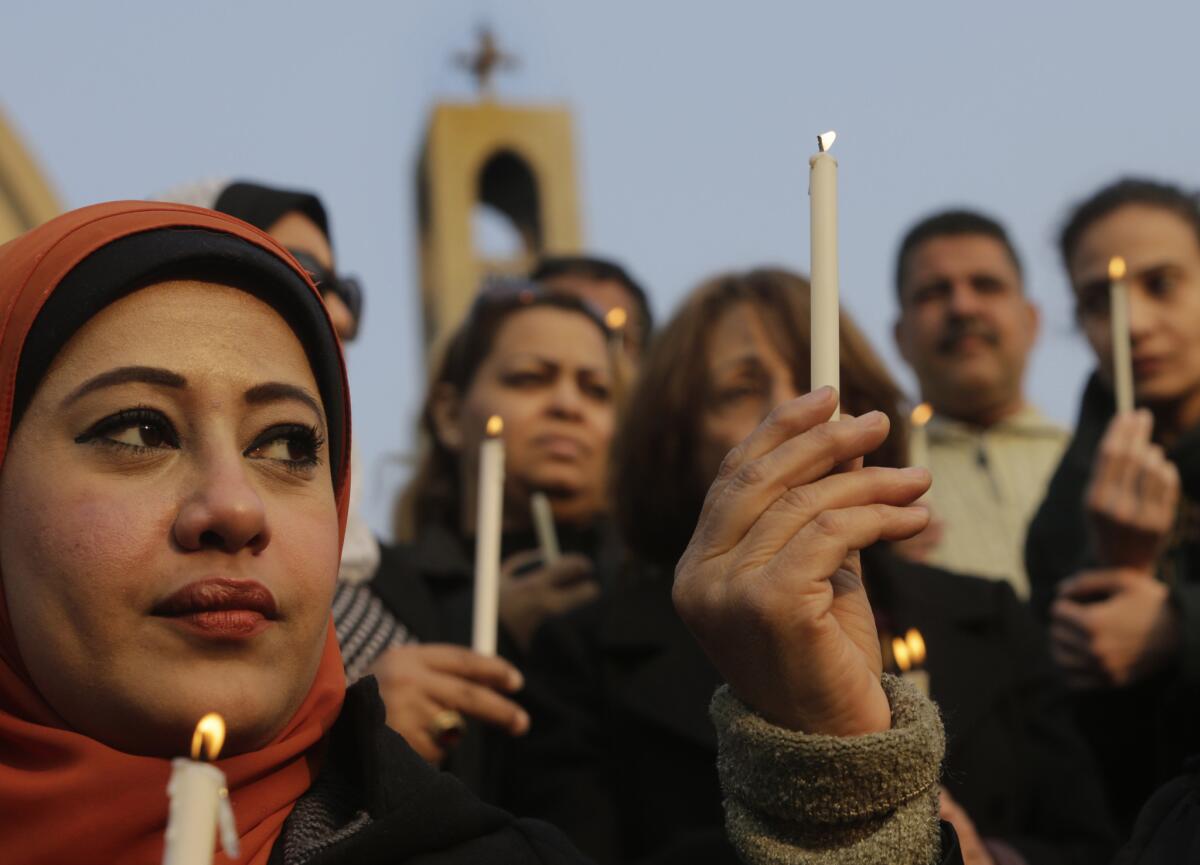U.N. Security Council to meet on Libya after Islamic State violence

- Share via
Reporting from Washington — The U.N. Security Council called an emergency session for Wednesday to address the explosion of terrorist violence in Libya, but world powers appeared sharply divided on how to deal with the country’s deepening turmoil.
Two days after a video surfaced that appeared to show Islamic State militants in Libya beheading 21 Christian Egyptians, diplomats at the United Nations said Tuesday that they were preparing a resolution that they hoped would provide a more effective way to wind down the country’s raging civil war. They provided no details.
But there appeared to be little appetite for the kind of international military mission sought by Egypt, which bombed an Islamic State base in Libya in a retaliatory raid Monday.
Officials of Britain and the European Union made clear they would have no role in a new Western military mission. Italy’s Prime Minister, Matteo Renzi, distanced himself from his defense minister’s promise that Italy would contribute troops to an international combat mission.
“There is no reason to jump from total indifference to hysteria,” he said.
The Obama administration, which initiated the 2011 North Atlantic Treaty Organization mission that toppled former leader Moammar Kadafi, declined to discuss what course it favored.
“We’re going to let the discussion play out,” Jen Psaki, a State Department spokeswoman, said at a daily briefing for reporters. “We don’t have any specific comment.”
The civil war is pitting two rival governments, a number of militias and Islamist militant groups, all vying for control of the thinly-populated state and its vast oil resources.
Western nations have become ever more worried by the growing violence and trafficking in arms, drugs and migrants. But the greatest concern is the expansion of Islamic State-affiliated groups, which are now in three Libyan locations and appear to be expanding.
The United Nations has been working through special envoy Bernardino Leon to try to persuade the rival groups to agree on a sharing of power. He has made little headway.
The U.S. and European countries have intermittently issued statements deploring Libya’s divisions and calling for invigorated diplomacy, but have avoided involvement in any costly nation-building effort.
Any proposal for a U.N.-authorized international military mission would likely face a veto from Russia, which continues to cite the 2011 NATO intervention as a prime example of Western meddling. A Russian deputy prime minister, Mikhail Bogdanov, this week blamed Islamic State’s atrocities on the 2011 intervention.
“This, of course, is all a consequence of what has been done by Western partners,” Bogdanov said, according to the TASS news agency.
The Obama administration appears ready to use both economic sanctions and possibly a counterterrorism campaign in Libya.
Deborah K. Jones, the U.S. ambassador to Libya, said Tuesday in an article in the online Libya Herald that “those who continue to fight, those who refuse to engage in dialogue, must be sanctioned by the international community -- and we are prepared to do that.”
U.S. military and intelligence officials have acknowledged this year that they are increasingly concerned by the extremists group’s expansion in Libya, and are prepared to take steps to counter it if the danger grows.
President Obama this month sent Congress a draft Authorization for the Use of Military Force that provided for the possibility that the United States might have to attack small bands of militants in Libya.
The discussion about a new international action is politically sensitive because of accusations that NATO blundered in undertaking the mission, or at least in failing to create a stable country afterward.
Jones, in her Libya Herald article, insisted that such accusations were groundless, because no one could have foreseen how the Libyan state would melt away after Kadafi’s death.
No one “recognized the depth of the fissures within Libyan society created by 42 years of Qaddafi’s despotic and psychologically damaging rule,” she wrote.
But Obama has acknowledged that he has had second thoughts about Libya. In an interview in August with columnist Thomas Friedman, Obama said the Western failure to do more in 2011 to put Libya on a democratic path was his greatest foreign policy regret.
Twitter: @richtpau
More to Read
Sign up for Essential California
The most important California stories and recommendations in your inbox every morning.
You may occasionally receive promotional content from the Los Angeles Times.














